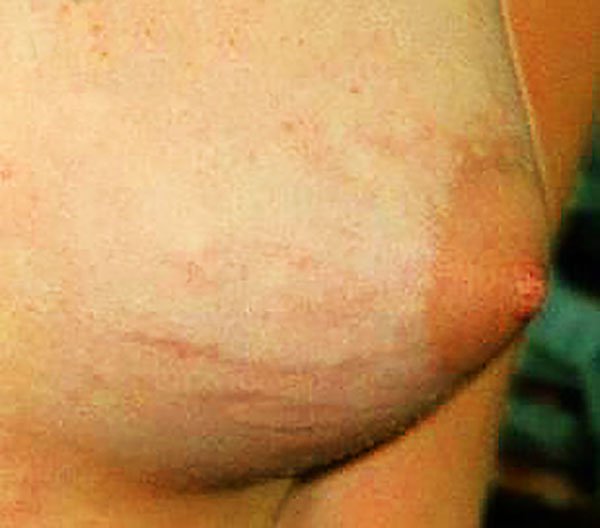
Pregnancy causes many changes in a woman’s body. Among these changes, stretch marks, also known as striae gravidarum, are particularly common during and after pregnancy and are a natural reaction to the rapid growth of a woman’s body. These streaks often appear on the abdomen, breasts, hips, and thighs, leaving many women searching for solutions to prevent and treat them. This comprehensive guide covers everything you need to know about stretch marks.
What Causes Stretch Marks During Pregnancy?
Stretch marks, or striae gravidarum, develop when the skin stretches rapidly due to the growing baby and hormonal changes. These factors contribute to the development of stretch marks during pregnancy:
- Rapid Skin Stretching: The expanding abdomen and breasts stretch the skin beyond its elastic capacity.
- Hormonal Changes: Increased levels of hormones like estrogen and cortisol weaken skin fibres, making them more prone to tearing.
- Genetics: A family history of stretch marks increases your likelihood of developing them.
- Skin Type and Condition: Dry or less elastic skin is more susceptible to stretch marks.

Preventing Stretch Marks During Pregnancy
While it’s impossible to guarantee prevention, several strategies can minimize the risk and severity of stretch marks:
- Maintain a Healthy Weight: Aim for gradual, steady weight gain to reduce skin stress.
- Stay Hydrated: Drink plenty of water to keep skin hydrated and more elastic.
- Nourish Your Skin: Regularly moisturize with creams or oils rich in vitamins and nutrients. Look for ingredients like hyaluronic acid, cocoa butter, and shea butter.
- Balanced Diet: Eat foods high in vitamins C and E, zinc, and protein to support skin health.
- Exercise Regularly: Promotes good circulation, helping to maintain skin elasticity.
Natural Remedies for Stretch Marks During Pregnancy
During pregnancy, several home remedies can help improve the appearance of stretch marks:
- Aloe Vera: Apply pure aloe vera gel to soothe and repair skin.
- Coconut Oil: Rich in fatty acids, it helps keep skin moisturized and promotes healing.
- Vitamin E Oil: Antioxidant properties aid in skin repair and moisture retention.
- Sugar Scrub: Exfoliates the skin, promoting circulation and removing dead skin cells.
Postpartum Care for Stretch Marks
- After pregnancy, the skin gradually starts to heal and regain its elasticity. Here are some tips for postpartum stretch mark care and several treatments that can help reduce their appearance:
- Continue Moisturizing: Keep your skin hydrated to support healing and elasticity.
- Balanced Diet and Hydration: Maintain a healthy diet rich in vitamins and minerals.
- Laser Therapy: Postpartum treatment that stimulates collagen and elastin production, reducing stretch marks.
- Microneedling: Uses tiny needles to promote collagen production, effective for reducing the appearance of stretch marks postpartum.
- Chemical Peels: Removes the outer layer of skin, encouraging new, more elastic skin to grow.
- Intensive Stretch Mark Therapy: Skinception® Intensive Stretch Mark Therapy has been formulated with a series of clinically proven active dermaceutical ingredients that boost your natural production of both collagen and elastin where it’s applied!
Conclusion
Stretch marks are a natural part of pregnancy for many women. While completely preventing them might not be possible, understanding their causes and exploring various treatment options can help manage their appearance. Whether you choose medical treatments, natural remedies, or preventive measures, consistency and patience are key. By taking care of your skin and overall health, you can minimize the impact of stretch marks and enjoy your pregnancy with confidence.
RECENT POSTS
- The Differences in a Twin Pregnancy: What You Need to Know
- What is the significance of bleeding at different stages of pregnancy?
- How to Cope with Claustrophobia: Effective Strategies for Managing Anxiety
- 50 Great Bible Quotes Relating to Pregnancy
- 10 Tips for Getting a Baby to Sleep
- How Much Sleep Does a Baby Need? A Comprehensive Guide for New Parents
- How to Make Money with ChatGPT: A Comprehensive Guide
- Unexplained Infertility: What Can You Do. Advice and Guidance
- The Benefits of Mindfulness: A Practical Guide to a Healthier and Happier Life
- Constipation During Pregnancy: Causes, Prevention, and Relief
- Pregnancy Myths, Superstitions, and Old Wives’ Tales: Fact or Fiction
- Endometriosis: The Impact on Fertility and Pregnancy
- Disabled and Pregnant: Equality Problems and Solutions
- Meconium Clinical Significance and Warning Signs
- Hypnosis in Pregnancy and Delivery: A Comprehensive Guide
- Pregnancy Tests: What is Amniocentesis? Your Complete Guide.
- Study at Home for a New Job or New Career: Your Path to Success
- What is Advanced Maternal Age?
- Essential Guide to Changes in Pregnancy
- Buying for a New Baby: The Essentials

Leave a Reply